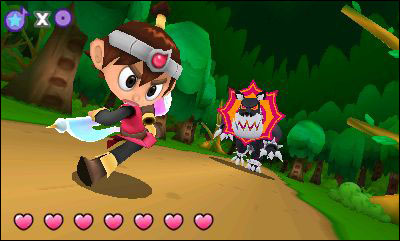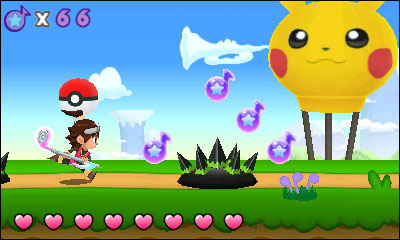
It’s really been a long time since I played a truly lighthearted video game. My usual gaming pattern these days includes titles like Killing Floor, Dark Souls, Persona 4 Arena, Guild Wars 2, and Team Fortress 2; all titles that tend to require a lot of focus and concentration. It had been a while since I played a title that I could just sit back with and truly enjoy myself. Harmoknight is that title.

Harmoknight is the result of a team from Pokémon developer Game Freak looking to try something a bit different. In the game, you play as Tempo, a warrior in training on a quest to save the world of Melodia from an alien threat called the Noizoids. Traveling with him is his tap-dancing rabbit friend, Tappy, who does all the talking for Tempo. You’ll also encounter two other friendly faces that you can take control of at certain points: Lyra is a warrior that uses a harp as a bow to take out distant targets, and Tyko is an adventurer that uses drumsticks to bash enemies that come his way.
Playing as Tempo requires you to traverse stages in an on-rails platforming format. Tempo will run at his own speed, and you’ll need to be able to have him jump over obstacles like pits and spike traps, while also smacking around critters that try to damage him. Lyra and Tyko also tag themselves in during certain stages and have their own play styles, though you can never choose to play as either of them directly. All the while, you’ll need to collect music notes scattered along your path, which add to your overall score. Having a high enough score allows you to acquire a royal note, which you need to collect to proceed past several roadblocks on the world map.

The true beauty of the game comes in its overall theme of music. When you succeed in doing a jump or a hit, or collect a series of notes in succession, you’ll create sounds that coincide with the music of the stage you’re playing. In this sense, you’re essentially helping to create the stage’s music. Enemies also have their own audio patterns that help you to time your strikes, and the stages are littered with instrument plants that can give you additional notes if you hit them at the right time, and help you keep your rhythm. Everything on the stage is tied together in order to create an entire song, with you playing conductor.

While the game itself doesn’t get obscenely difficult, there is a fair amount of challenge to the whole process. As you progress through the game, the patterns you come up against start to become more complex, and the game throws different kinds of tricks at you, such as branching paths, visual obstructions, and alternating rhythms that can mess up your timing and result in the occasional cheap hit or fall. The actual time frame to perform an action can also be fairly strict, with the difference between a successful hit and a dud or you taking damage seemingly being a fraction of a second.
The trickiest portion of the game (not including the optional final world) comes from the boss battles. These operate in a different manner from the regular stages, being more cinematic experiences than actual levels, and instead requiring the player to mimic inputs to progress through the encounter. These start with basic jumps and hits, but then evolve into lefts and rights and ups and downs, eventually mixing most everything in at once in an attempt to overwhelm you. Memorizing the patterns and knowing the timing are key to being able to get through each boss battle with a high score.

Thankfully, the game never becomes too much of a frustrating endeavor. The rating system for scores is fairly lenient, and getting royal notes shouldn’t be too much of a problem. Stages themselves, while not having any checkpoints, are also short, making retrying them in the event of failing a less annoying ordeal. Although this results in a fairly short game that can be beaten within a few scant hours, you can unlock “fast” versions of stages that you do well in, which add another layer of difficulty. You can also unlock bonus stages by clearing each of the worlds you can traverse through. These stages offer a different set of challenges, and also reference Game Freak’s Pokemon background. Is it pandering to their fanbase? Maybe. But thankfully it doesn’t do anything to hamper the experience.

Although you can see areas where Game Freak shows their inexperience in platformers, it’s good to see the developer stepping out of their comfort zone and exploring different genres. Sure the story could be more fleshed out and a couple worlds seem to have just been lazily plopped in for filler, but if you’re looking for a simple game that you can pick up and play after a long and stressful day, you can’t really go wrong with this one. Harmoknight is a creative and enjoyable experience that both rhythm and platformer game fans can get behind, and though the journey through Melodia is a short one, it’s still a fun adventure.
by Michael Revis
Related Links:
Official Website
Already have a VIZ account? Log in.
Don't have an account? Sign up.
Enter the e-mail address associated with your account and we'll email you a link to reset your password.